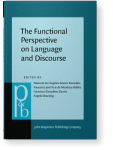Nominal reference and the dynamics of discourse
A cognitive-functional approach
In this paper I will address what appear to be some important gaps in the
traditional approach to nominal reference as a cohesion-creating resource:
(i) ignoring of relations other than co-referentiality, such as those expressed by
quantifying determiners, (ii) neglect of the contribution made by type specifications
to the reference function; (iii) restriction of the type specifications to those
lexically predicated by the NP itself, (iv) discounting of the cumulative build-up
of information relating to referential sets and referent classification in the mind
of the reader. In the first half of the article, I survey the cognitive instructions
given by the main determiner types of NPs: definite versus indefinite identifiers,
and relative versus absolute quantifiers. In the second half of the article
I develop and illustrate an alternative analysis of discourse referents that does
take into account elements (i) to (iv).
